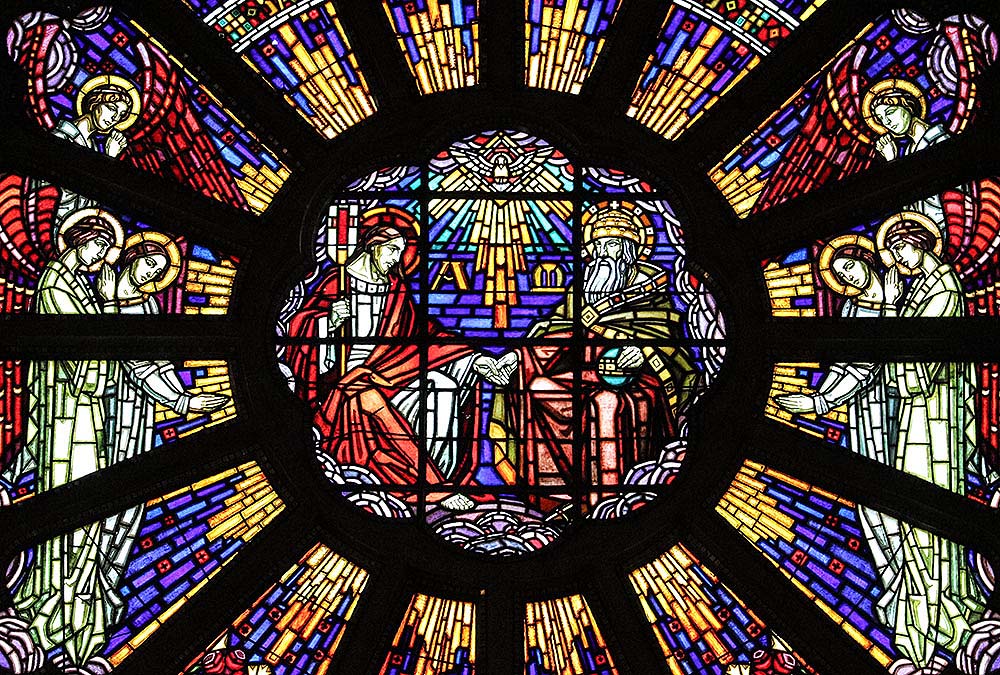
(Wikimedia Commons/Lepocheux)
From where do we draw our images of God? Did you actually try drawing some as a child?
Our God image will have a lot to do with our image of ourselves, others and life itself.
When Moses talks to his people about their God, he presents a variety of images. He talks about God as speaking from the fire, wreaking terror on their enemies, taking his people as a personal possession and freeing them from oppression.
All of those words describe God's action, not God's self. Psalm 33 speaks of the Lord, avoiding the use of the name God revealed to Moses because mere human beings cannot be worthy to pronounce God's name. With that reverence, the psalm describes God as a powerful creator, just, kind, trustworthy and ever mindful of those who seek divine mercy.
These are but a few of the multiple images of God we encounter in the Hebrew Scriptures. In today's first reading, we see signs of Israel's developing spirituality and theology. In the best cases, spirituality, the experience of relationship with God, comes before theology. Theology then attempts to express the meaning of that experience.
There was a time when Israel believed in their god as the best of many. Slowly, they came to believe in one God, the one who chose them. Every stage of this development had effects on their relationships with God and one another.
As we recognize this variety of images, we realize that the Bible does not define dogma, rather, it preserves the legacy of humanity's ever-growing understanding of the God who made us in the divine image and seeks us out in love.
Our earliest ancestors in Christian faith grappled with the immense challenge of trying to understand who Jesus was and what he revealed about God and the world. Throughout Jesus' ministry, the disciples were accustomed to hearing Jesus speak of God as his Father, the source of his life, the one whose mission he was carrying out and whose reign he was revealing. They saw him as a prophet — perhaps the Messiah.
His resurrection cast a vastly new light on all their thinking, a light so bright that they could hardly comprehend what it meant.
Because Paul's letter to the Romans was written before any of our four Gospels, it gives us a glimpse of how Christian thinking was developing before Matthew, Mark, Luke and John wrote their testimonies.
Advertisement
Just before his famous explanation of the world's evolving toward fullness in God (8:19-29), Paul talked about how our relationship to Christ changes all our other relationships. By saying, "you received a spirit of adoption," Paul puts us on a relationship par with Christ. We can call upon God as our Father in the same way as Jesus did because God considers us "joint heirs" with him.
This implies that we share in his relationship with God, and if with God, then with the rest of creation as well.
These Scriptures lead us toward the mystery we celebrate today with the Solemnity of the Most Holy Trinity. Jesus revealed that God's love, the only relationship God desires with creation, draws us into union with God and all that God loves.
Although Paul is not proposing the concept of God as Trinity, in this short passage, he does relate to Christ, the Father and the Spirit. Experience precedes theologizing. Paul is talking about the community's experience of relationship with God — finding the right words to explain that relationship is a process that's been going on for two millennia.
Jesus commissioned his disciples to share their faith in God, knowing that mission is a spiraling experience.
This leads us to consider the end of Matthew's Gospel. Matthew portrays Jesus as saying two key things before he departs. First, he tells the disciples to make and baptize disciples in the name of the Father, Son and Spirit. Like what Paul said to the Romans, this reflects the community's insight into Jesus, what he taught about God as Father, and their own experience of the Spirit of God. Matthew's intention here was not to teach theology but to propel disciples into mission.
From Moses to Matthew, today's Scriptures are a call to contemplation and action. Theology helps us understand, but no amount of theory can give us "the correct" or "orthodox" image of God. God is beyond our comprehension, and if we are growing in faith, our awareness of God will grow and change.
Jesus commissioned his disciples to share their faith in God, knowing that mission is a spiraling experience: As we share our faith, we grow in it; as we grow, we are ever more impelled to share our faith.
A community that lives mission will be an ever-growing and changing image of God in our world. In the end, that's what really matters.
